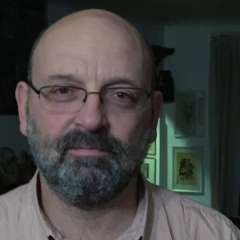Similar to the other two new productions part in San Francisco Opera’s summer season (Handel’s Orlando and Bizet’s Carmen) Rusalka is a carefully selected import. The Scottish director Sir David McVicar first presented this mise-en-scène at the Chicago Lyric Opera in 2014.
The universe that McVicar conceived and Leah Hausman re-staged for the benefit of the North Californian public is richer and far darker than standard frameworks presenting the tragic destiny of a water nymph wishing to become human, to find love and to attain a soul. The wood clearing where the first and the last act take place has nothing idyllic. The scenery (John Macfarlane), the costumes (Moritz Junge) and the lighting (David Finn) have an almost Boschian quality. The lake is a hole in the ground covered by fumes. The trees have no leaves at all. The witch Ježibaba is accompanied by a retinue of three aggressive bipeds with crow-like heads and wings. The wood nymphs dance (choreographed by Andrew George) has nothing reminiscent of Arcadia. The characters frolic and cavort as they would be just emerging from a painting such as “The garden of earthly delights”.
Not that the castle interiors in the second act look less menacing. The kitchen is dominated by a huge hanging carcass. The cauldron could have been used by witches. Eviscerated fowls are dripping with blood. In a second scene, the prison-like ballroom is narrow and deep with a wall covered by frightening hunting trophies. No occasional comic relief can hide the overall morose atmosphere. There is a clear disconnect between man and nature. They can’t communicate and Rusalka losing her voice as part of her Faustian bargain is just an example. Humans are just plunderers – the burnt forest, the slaughtered animals – and they shouldn’t be surprised by nature indiscriminately “reacting” and punishing the innocent (Vodník just grabbing the Kitchen Boy and pulling him into the deep abyss).
The overall gloom and doom was not the most innovative directorial idea. One can safely assume that hopelessness is inherent to Jaroslav Kvapil’s libretto and to the romantic fairy tales it was based on. It can certainly be perceived in Dvořák’s score. Actually, the interesting perspective brought by McVicar was telling the story from the unnamed Prince’s point of view. During the overture, in front of a curtain depicting a banal, moonlit, lakeshore landscape, you see him unhappy, arguing with the Foreign Princess (his wife?), desperately swallowing some drugs and, in a state of torpor, invoking an alternate world into existence.
Both vocally and instrumentally, this was a high-class performance. Rachel Willis-Sørensen, in her role debut, became more and more confident as the evening passed, even if her acting occasionally had a studied quality. She sang gloriously, with poignancy and resolve, especially in her lower register. The pinnacle of her rendition was not the famous “Song to the moon” – that she had to sing from awkward position – but the extended scene at the beginning of the third act where she laments her cruel fate. The Prince in Rusalka is one of Brandon Jovanovich’s calling cards. The ability to infuse his Heldentenor voice with a certain Slavic-tinged lyricism is very well suited for the role. His final, evidently Tristan-influenced, duet with Willis-Sørensen, had a truly remarkable tenderness.
In her debut as the Foreign Princess, Canadian soprano Sarah Cambidge demonstrated the Wagnerian qualities of her young voice. Bass Kristinn Sigmundsson beautifully portrayed Vodník, the Water Goblin, both his fatherly despair and also his spite. Like Midas, mezzo-soprano Jamie Barton, can turn every role she touches into gold. Tinged with humor and compassion, her Ježibaba is unforgettable. Laura Krumm and Philip Horst were irreproachable as the Kitchen Boy and the Gamekeeper, respectively.
In her San Francisco Opera debut, conductor Eun Sun Kim assuredly drew splendid playing from an ensemble that proved its versatility (the instrumentalists spent the prior night playing Baroque). She brought forward the music’s visceral quality laying deep under the folkloric connotations. More, she succeeded to balance Wagnerian-like statements with subtle invocations of Mendelssohnian delicacy.


